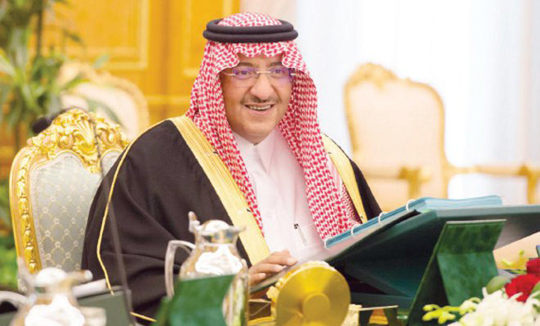Riyadh, Mar 7: Crown Prince Mohammed bin Naif said the successful talks between King Salman and the leaders in Malaysia, Indonesia and Brunei have embodied appreciation, respect and the deep relations between the Kingdom and these countries.

Briefing the Cabinet session at Yamamah Palace here Monday under his chairmanship, the crown prince said that the warm reception accorded the king and accompanying delegation during his current visit to Asian countries, and the signing of a series of agreements, come within the keenness of the Kingdom and these countries to enhance relations in different areas.
The Cabinet acknowledged the following awards to the king: the Medal of Crown in Malaysia, the Medal of Star in Indonesia, the Medal of Royal Family in Brunei, and the awarding the king with an honorary Ph.D. in literature from the University of Malaya, an honorary Ph.D. in political science and an award for unique excellence achievement in the service of Islam from the International Islamic University in Malaysia. The Cabinet recognizes that he received these honors for his efforts for Islam and Muslims, an appreciation and recognition for great status enjoyed by the king in serving Islam, and the embodiment of strong relations between the Kingdom and these countries.
The Cabinet appreciated the king’s talks in these countries, which contributed to strengthening bilateral relations in many areas, in a manner that will enhance joint understanding, and serve global peace and security.
The Cabinet praised the announcement of the establishment of the King Salman Center for Global Peace in Malaysia, as well as Saudi Aramco’s joint venture with the Malaysian Petronas Company to acquire and develop a refinery project in Malaysia.
The Cabinet stressed the important comments expressed by the king during his visits to Malaysia and Indonesia. It singled out the king’s call on fighting terrorism and extremism, and promoting dialogue between religions and cultures to enhance the spirit of tolerance in a manner that will serve joint interests and global peace and security.
In addition, the Cabinet expressed thanks and appreciation to King Salman for ordering male and female students studying at their expense in Malaysia to join the educational mission within the program for foreign scholarship.
The Cabinet touched on the 34th session of the UN Council on Human Rights in Geneva. The governing body stressed the Saudi address at this session, which affirmed the Kingdom’s desire to boost efforts to protect human rights at all levels, emanating from the principles of Shariah, and the necessity to protect families from deviation, disintegration, extremism, hatred and racism.
The Cabinet also approved the following:
• The Cabinet approved a memo of understating between the Saudi Ministry of Interior and the National Police Agency in the Republic of Korea for cooperation in areas related to security and fighting of crimes.
• The Cabinet authorized the president of King Abdul Aziz City for Science and Technology (KACST) to discuss with China a memo of understanding between the KACST and the Chinese National Aerospace Agency for cooperation in the mission of Chang’e-4 lunar probe.
• The Cabinet also authorized president of King Abdul Aziz City for Science and Technology (KACST) to discuss with Japan a memo of understanding for scientific and technical cooperation between the governments of Saudi Arabia and Japan.
• The Cabinet authorized the president of General Authority for Sports to discuss with Japan a draft protocol for cooperation in sports between the Saudi General Authority for Sports and the Japanese Ministry of Education, Culture, Sports, Science and Technology.
• The Cabinet authorized the minster of environment, water and agriculture to discuss with Japan a draft memo of understanding for cooperation on water processing and desalination between the Saudi Ministry of Environment, Water and Agriculture and the Japanese Ministry of Economy, Trade and Industry.
• The Cabinet authorized the minister of transport and board chairman of the General Authority of Civil Aviation to sign draft agreements between the governments of Saudi Arabia, Uganda, Ecuador, Kazakhstan and Somalia in air transport.
• The Cabinet authorized the minister of education to discuss with Maldives a memo of understating for scientific and educational cooperation between the Saudi Ministry of Education and the Ministry of Education of the Republic of Maldives.
• The Cabinet approved an agreement between the governments of Saudi Arabia and Mexico to avoid double taxation and stopping tax evasion on income tax.
• The Cabinet authorized the minister of finance to sign a draft agreement between the governments of Saudi Arabia and Mauritania, on the avoidance of double taxation on income tax and capital, and stopping tax evasion.






Comments
Add new comment